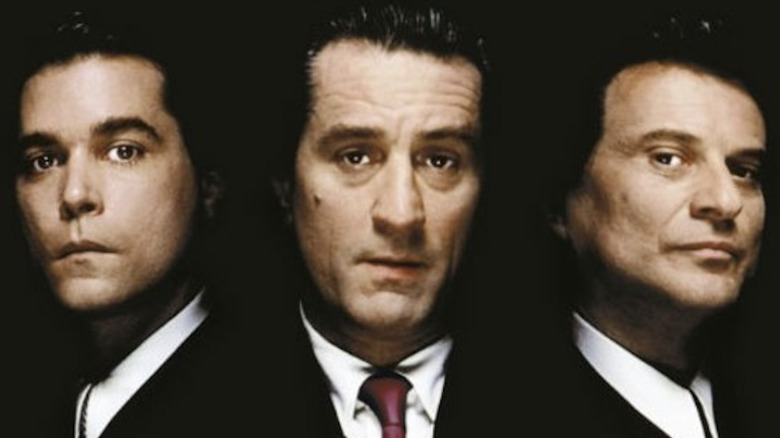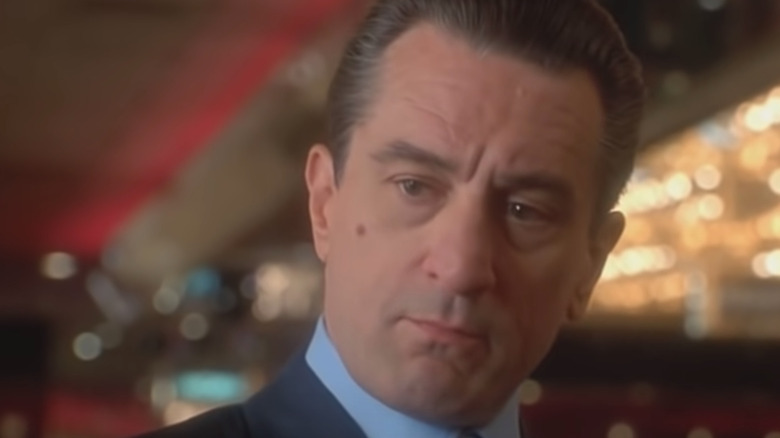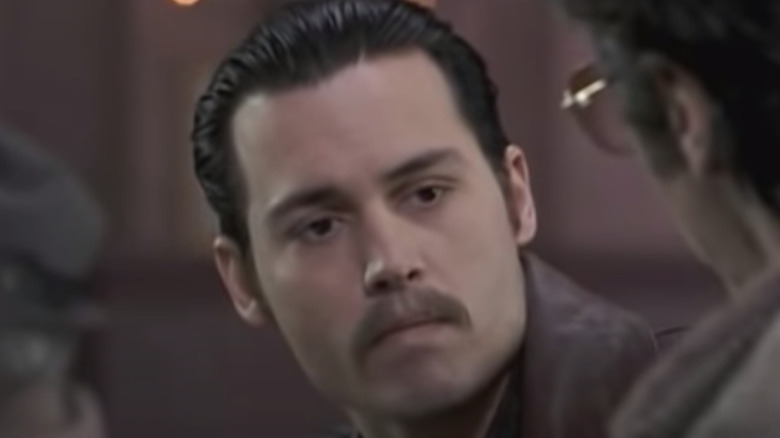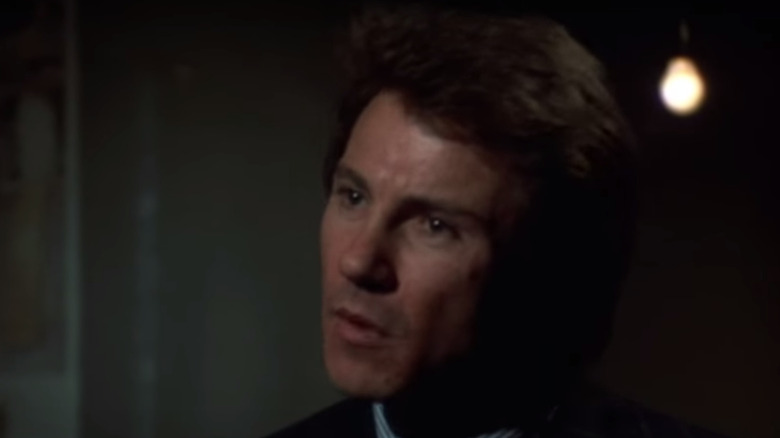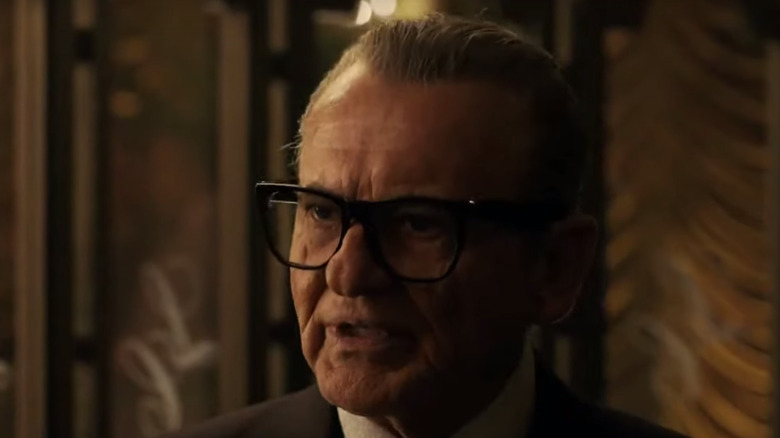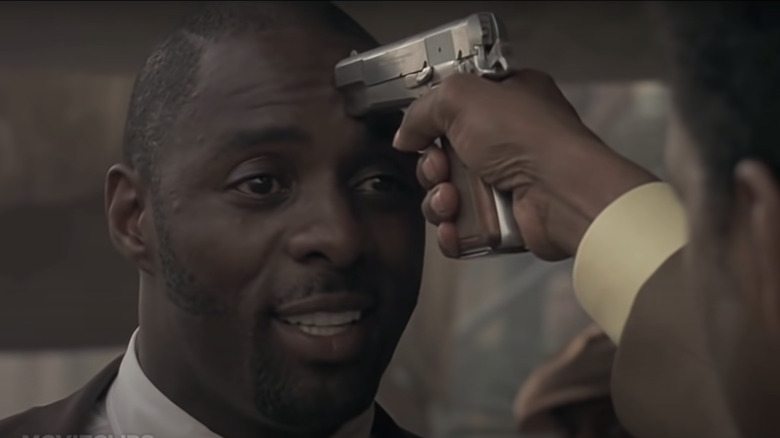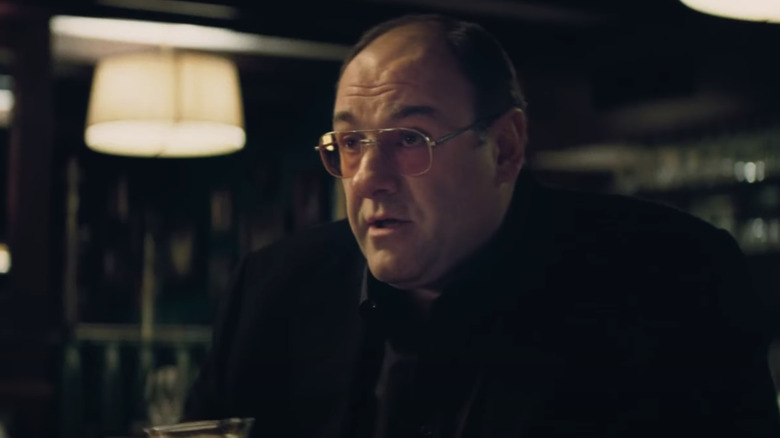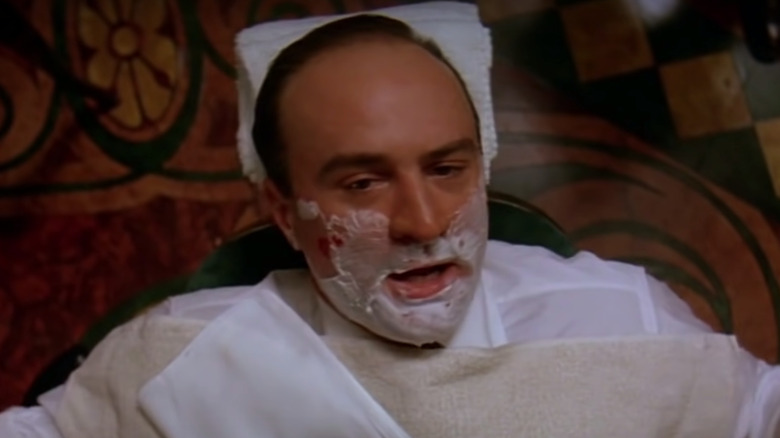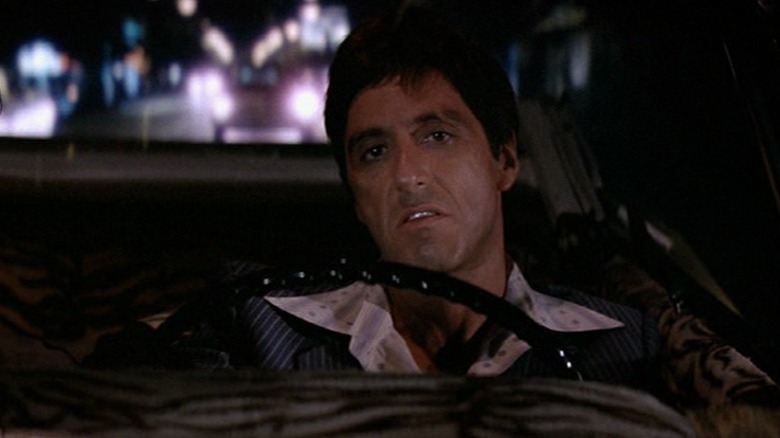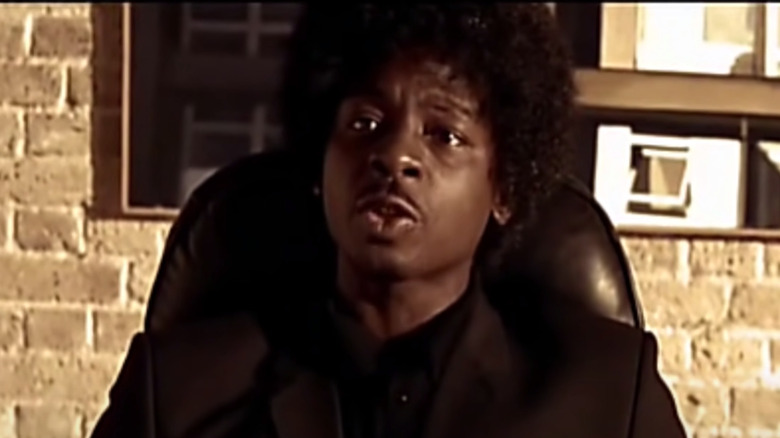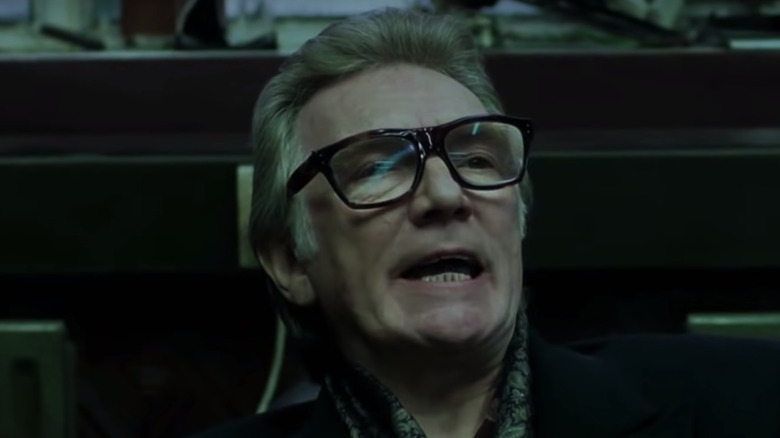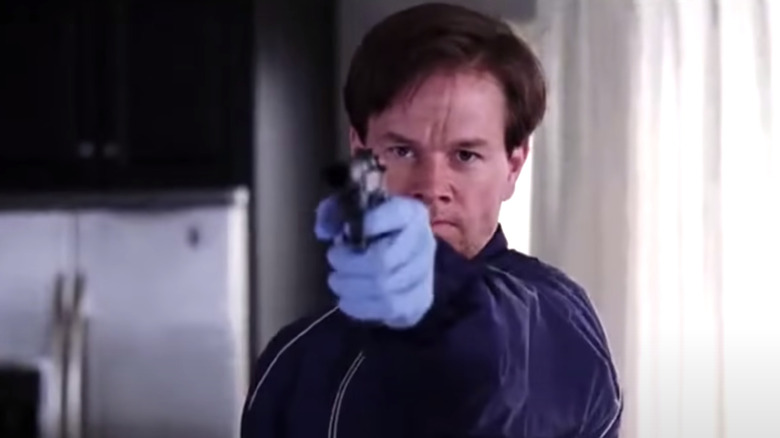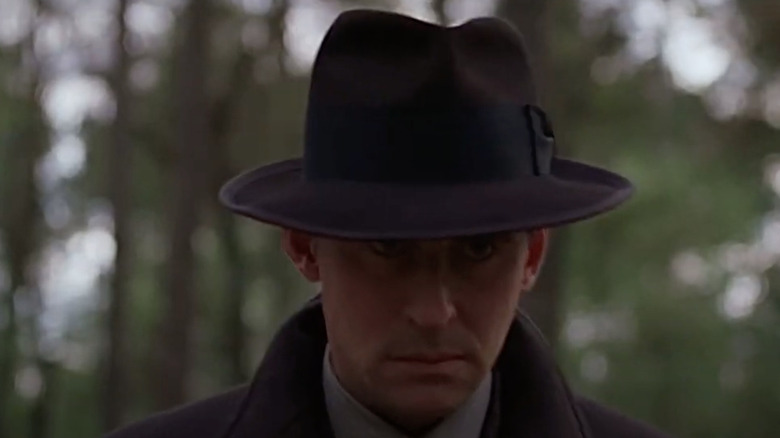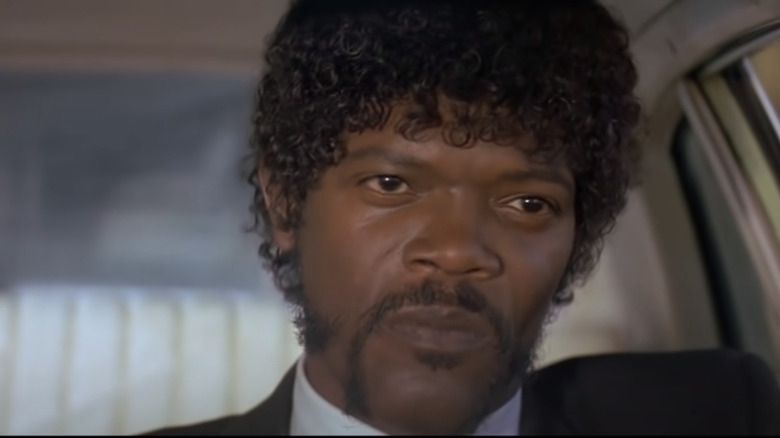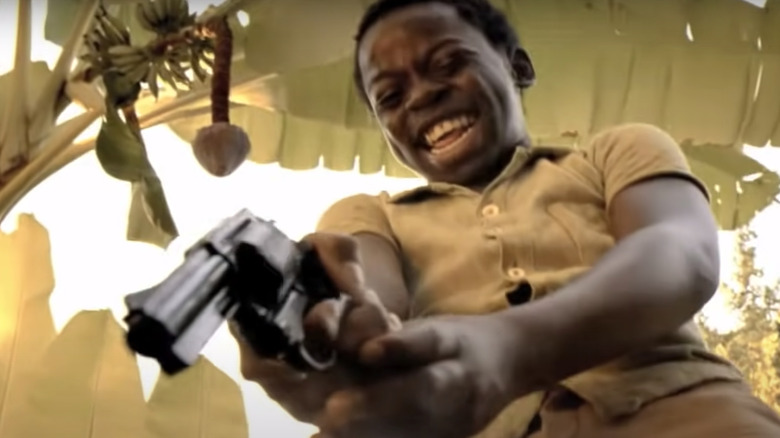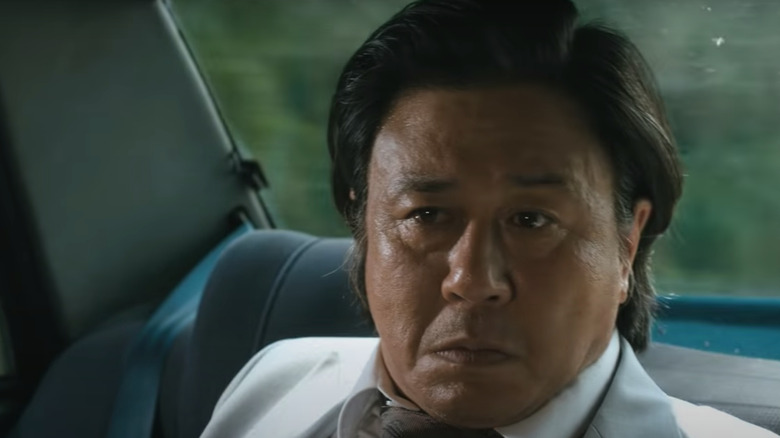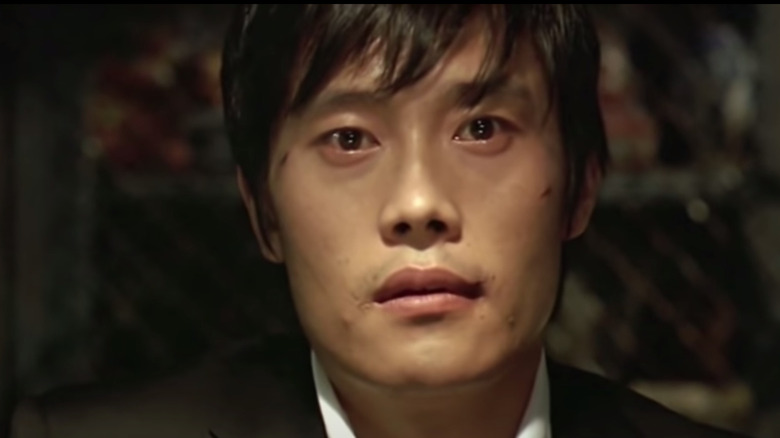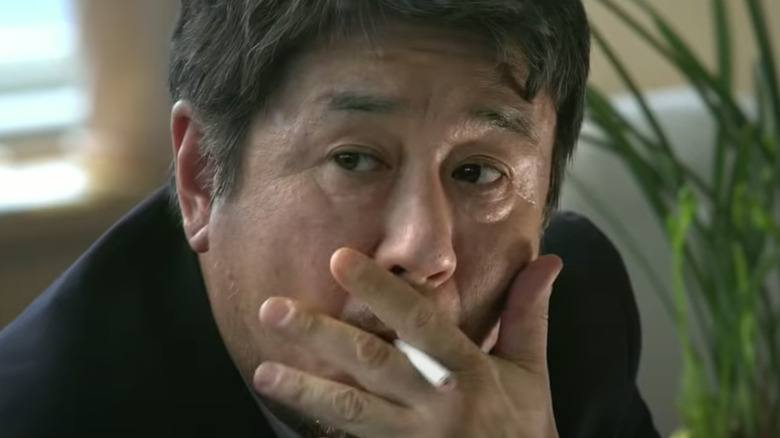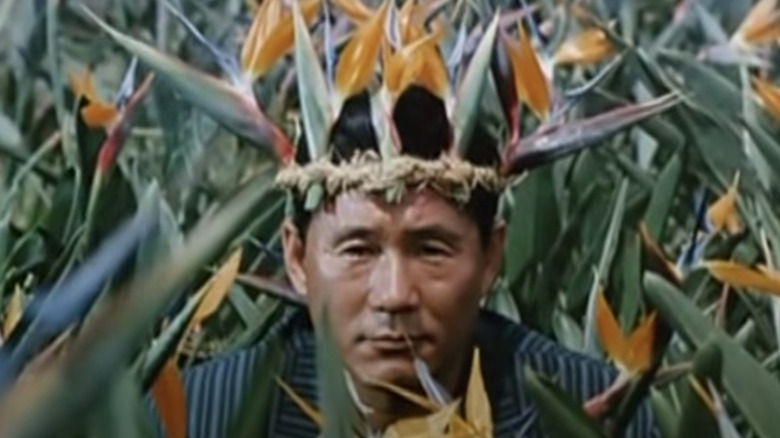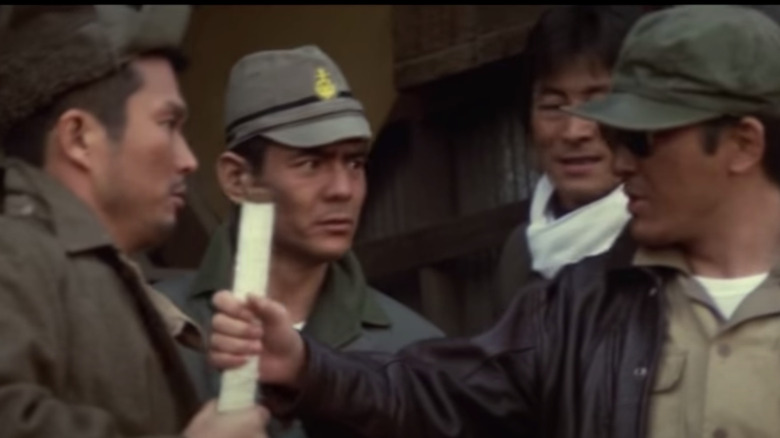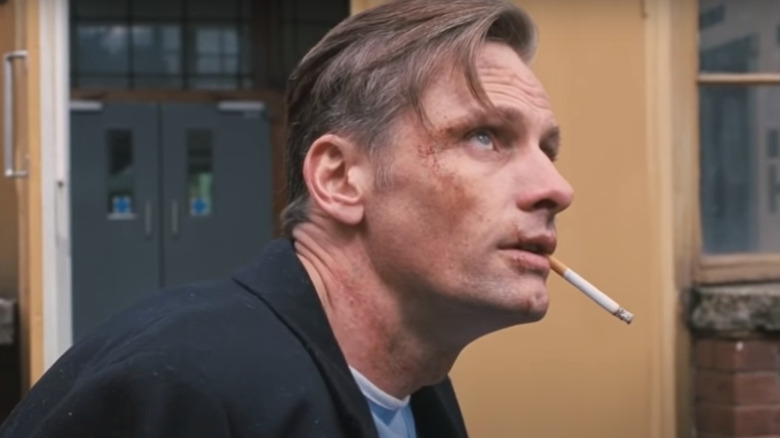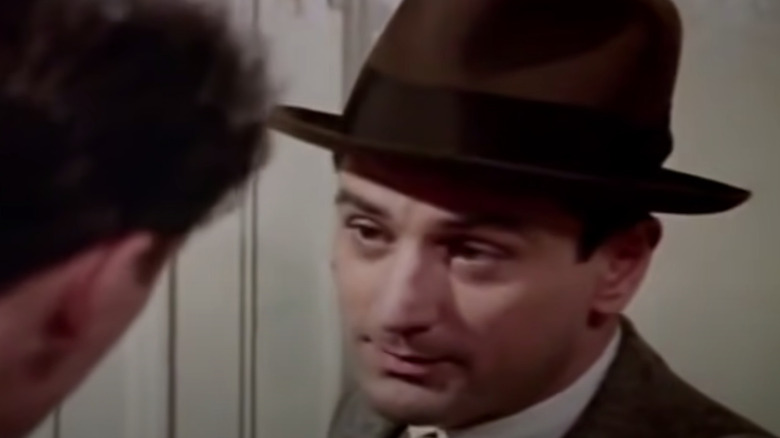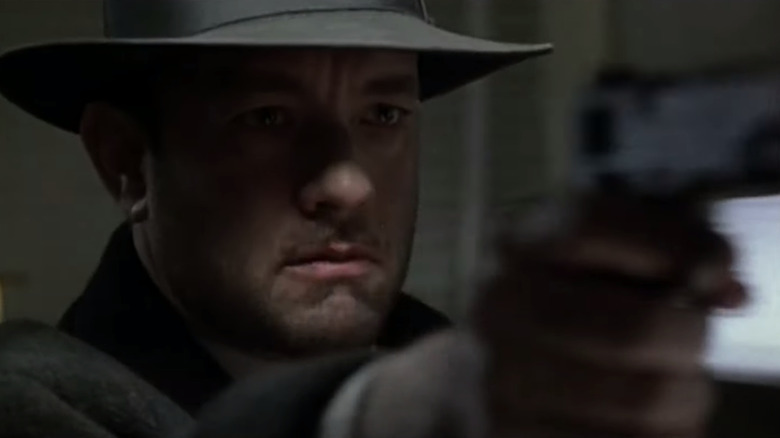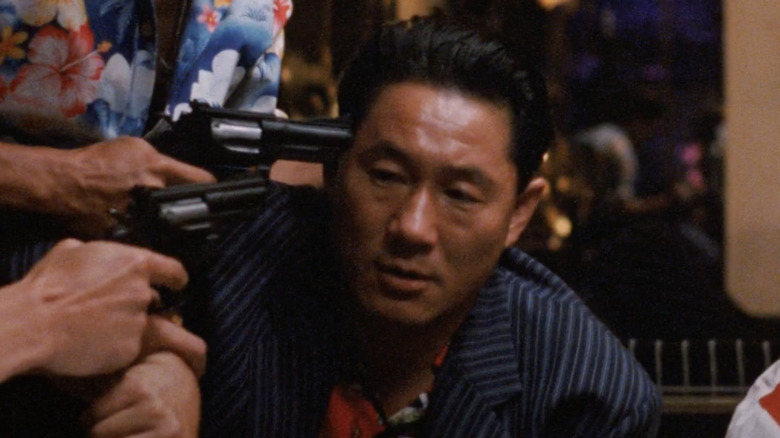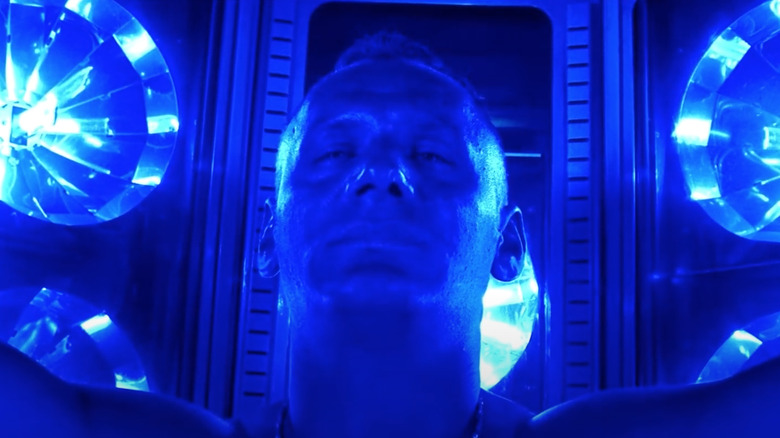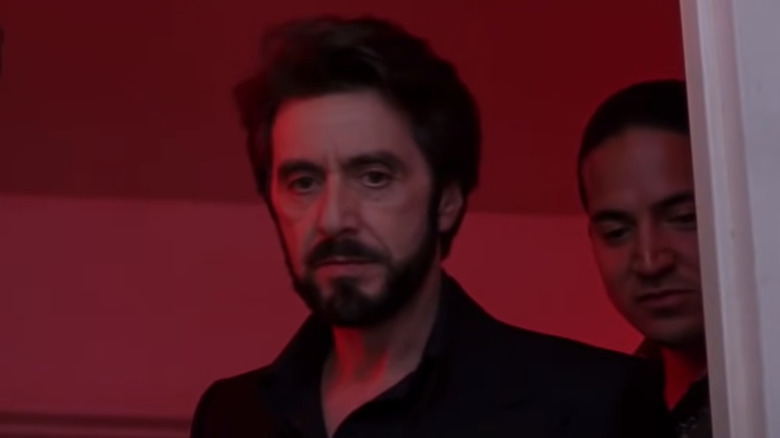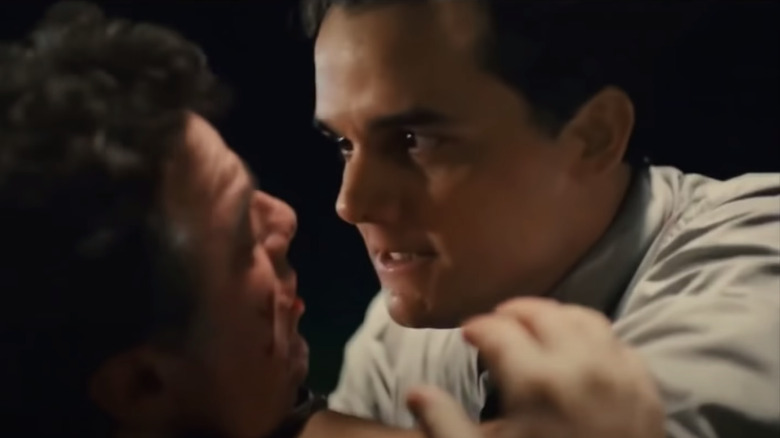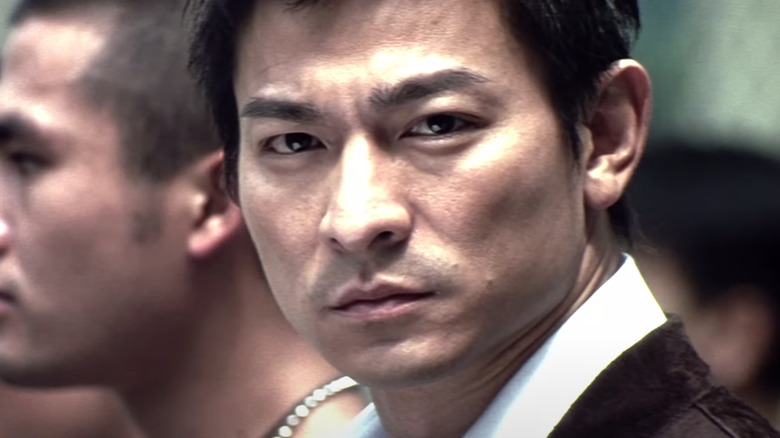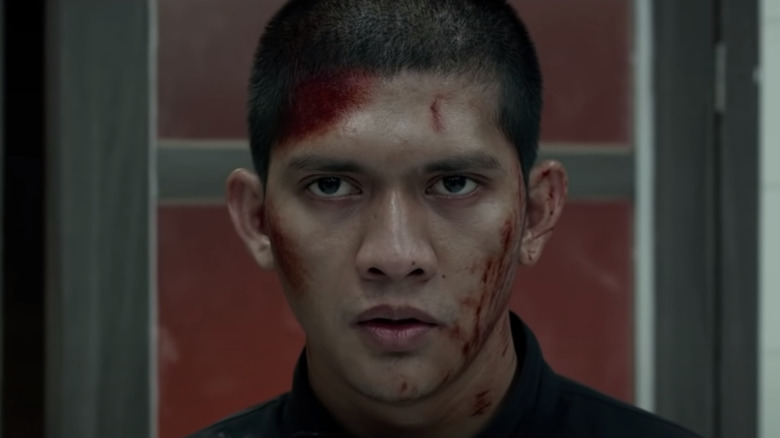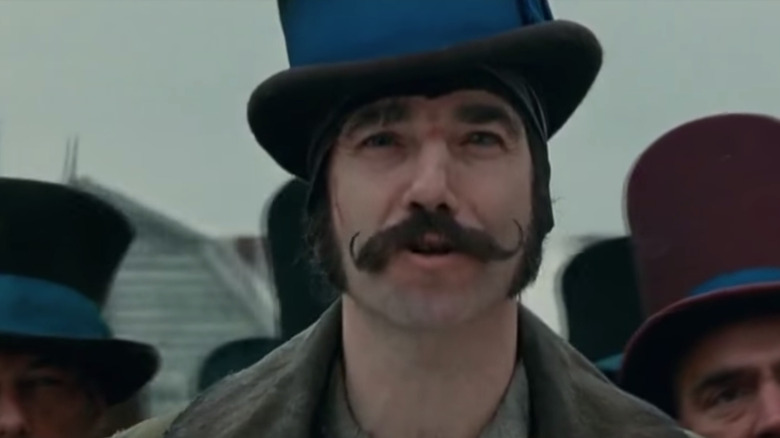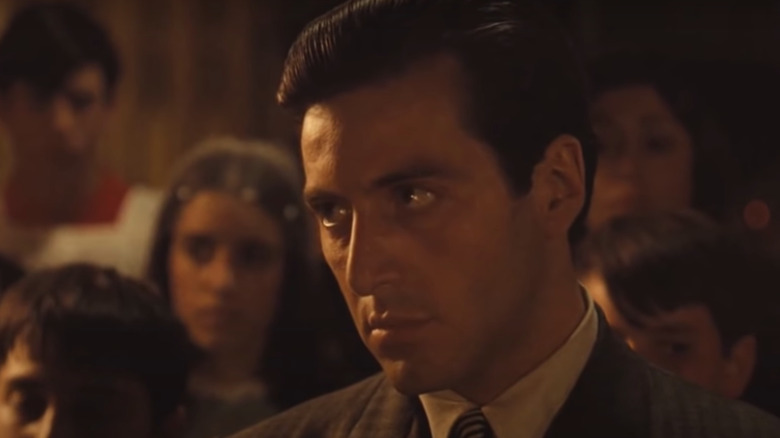30 Movies Like Goodfellas That Are Worth Your Time
Widely considered one of the best mob films — if not one of the best films of any genre — Martin Scorsese's "Goodfellas" was a classic from the moment its first frame flickered across the silver screen, with Ray Liotta's Henry Hill declaring in voiceover: "As far back as I can remember, I always wanted to be a gangster."
In a 30th anniversary retrospective, Rolling Stone called it the "template for the modern gangster movie" and credited the film with "completely revitalizing a genre and reshaping pop culture." In the years since its release, "Goodfellas" has proven to be as influential as it is entertaining, but it wasn't Martin Scorsese's first foray into the gangster genre, and neither would it be his last.
Scorsese co-wrote the "Goodfellas" screenplay with Nicholas Pileggi, who authored the non-fiction book "Wiseguy" that served as the film's source material, and the pair would reunite several times in the ensuing years. If you're a fan of tough-talking mobsters, out-of-left-field whacks, made men and horseheads in bends, here's a definitive list not only of Scorsese/Pileggi collaborations, but other mob movies also worth seeking out.
Casino (1995)
To be clear: "Casino" isn't a sequel to "Goodfellas." But it might as well be.
Just like that 1991 masterpiece, Pileggi first wrote "Casino" as a non-fiction book before he and Scorsese teamed up to compose an adapted screenplay. Robert De Niro and Pesci were brought back together for another expansive gangster film, this one centering around the mob's involvement in the development of Las Vegas as a hub for money laundering and other crimes. The film also has nearly more narration that actual dialogue, marking one of many daring choices Scorsese made in the film (using Devo in a gangster flick has to also be up there).
You could set your watch by how dependably De Niro and Pesci command the camera — and bring the best out in each other. Their relationship, as it devolves from friendship to bitter rivalry, is the dramatic core of the film. Sharon Stone's turn as the desperate, superficial trophy wife Ginger is equally great — and received the film's lone Oscar nomination for Best Actress in a Leading Role.
With a nearly three-hour runtime that breezes right by thanks to impressive pacing and top-notch editing from the legendary Thelma Schoonmaker, "Casino" is at various points funny, violent, stylish, and explosively dramatic. Many, many people have tried since 1990 to make the next "Goodfellas" — as it turns, out, Scorsese did it better than any of them.
Donnie Brasco (1997)
Director Mike Newell oversaw this acclaimed based-on-a-true-story tale of an FBI agent deep undercover inside the mafia. Adapted from the autobiography "Donnie Brasco: My Undercover Life in the Mafia" by Joseph D. Pistone and Richard Woodley, Pistone was the real-life FBI agent who adopted the false identity of Donnie Brasco, a jewel thief, to infiltrate the dangerous criminal organization known as the Bonnano Mafia Family. The adapted screenplay, written by Paul Attanasio, was nominated for an Oscar.
Johnny Depp stars as the titular character and turns in a strong performance, but Al Pacino steals the show in the film's main supporting role as Lefty, the older gangster who takes Donnie under his wing and shows him the ropes. Michael Madsen and Bruno Kirby also give memorable supporting performances. The fake gangster known as Donnie Brasco spent six years undercover, and "marked the first time that an undercover law enforcement agent ever had fully infiltrated the American Mafia," according to an interview with Pistone for UPI.
Mean Streets (1973)
Scorsese's first foray into the gangster genre arrived in 1973 and although it wasn't his first film (he had made "Who's That Knocking at My Door" and "Boxcar Bertha"), it did feel like the first "Scorsese movie." From the beginning of his career, the filmmaker was already displaying a keen interest in the themes that would define him: religion, loyalty, gangsters and the collateral damage left in the wake of others —and although "Mean Streets" is smaller scale (and much smaller budgeted) than his later efforts, the themes are all there. As is De Niro and Harvey Keitel, two of his most beloved leading men.
The movie follows Keitel as Charlie, a low-level thug with a friend who just can't manage to stay out of trouble. This trouble-making friend is Johnny Boy, played by Robert De Niro in one of his major breakout roles, just one year before his Oscar-winning turn in "The Godfather: Part II." De Niro and Scorsese would go on to collaborate on nine films in total through 2022.
The Irishman (2019)
Speaking of the De Niro/Scorsese collaborations, here's the latest — an Oscar-nominated opus which reminded all of Hollywood that names like Scorsese, De Niro, Pesci and Pacino still have something in the tank.
Scorsese spent years enraptured by the book "I Heard You Paint Houses" by Charles Brandt, and became determined to make what would eventually become a three-and-a-half-hour, CGI-heavy tale based on the is-it-true? story of "house painter" Frank Sheeran and teamsters figurehead Jimmy Hoffa. Spanning decades of organized crime, it required stars like Pesci, De Niro and Pacino to not only undergo heavy makeup, but also to be captured via state-of-the-art technology that could de-age the men decades for certain key scenes as their younger selves.
Pileggi served as an executive producer on the film, which marked a powerful reunion between the three-pronged business relationship/friendship of Pesci, De Niro, and Scorsese.
American Gangster (2007)
The "Irishman" team of screenwriter Steven Zaillian and executive producer Nicholas Pileggi collaborated on "American Gangster," though this time around, Martin Scorsese was not involved. After the film was nearly directed by Antoine Fuqua (as revealed on "The Charlie Rose Show"), Ridley Scott wound up in the director's chair.
Another true story of organized crime, "American Gangster" was based on a news article ("The Return of Superfly," written by Marc Jacobsen and published in New York Magazine) rather than a full non-fiction book, supplemented with first-hand interviews of those involved in the real events.
The film tracks the rise and fall of Frank Lucas (Denzel Washington), a Harlem kingpin who made millions importing and selling heroin. On the other side of the legal spectrum is Richie Roberts (Russell Crowe), a cop determined to take Lucas and his criminal organization down. Although the two lead actors don't share many scenes — this film almost feels as much like "Heat" as it does "Goodfellas" — their excellent, intense performances are backed by solid work from a cast of stars including Idris Elba, Josh Brolin, John Hawkes, Ted Levine, RZA, Chiwetel Ejiofor, Cuba Gooding Jr., and Ruby Dee.
Killing Them Softly (2012)
Written and directed by Andrew Dominik and adapted from the novel "Cogan's Trade" written by George V. Higgins (best known as the author behind the Boston mob book and 1973 film "The Friends of Eddie Coyle"), this gritty, contemplative flick starred Brad Pitt as Jackie Cogan, a mob enforcer brought to town to clean up a major mess after the mob is robbed by inept criminals.
Although Pitt is solid in the lead role, the film is often stolen by the rest of the cast, which includes the likes of James Gandolfini, Ben Mendelsohn, Scoot McNairy, and Ray Liotta. "Killing Them Softly" has a slick visual style, hard-boiled dialogue, and some interesting, multi-layered social commentary simmering in the background.
The Untouchables (1987)
Brian De Palma's crowd-pleasing classic was a blockbuster contribution to the gangster genre — and arguably one of the most successful TV-to-film adaptations ever attempted.
De Palma originally planned to have Bob Hoskins star in the Prohibition film as Al Capone, but ended up landing De Niro — and looking back now, it's impossible to imagine anyone else. The film tells the true (if highly dramatized) story of Capone's war against the Federal Prohibition Agent determined to take him down, Elliot Ness (Kevin Costner). Sean Connery won his only Oscar for the film, it made Andy Garcia a star, and De Niro also sizzled (the startlingly violent baseball-bat scene is a show-stopper) spitting out tough guy dialogue penned brilliantly by David Mamet:
"You wanna get Capone? Here's how you get him. He pulls a knife, you pull a gun. He sends one of yours to the hospital, you send one of his to the morgue! That's the Chicago way."
The music is another standout element, with legendary composer Ennio Morricone's original score receiving an Oscar nomination for Best Music at the 1988 Academy Awards. The film was nominated for four Academy Awards in total, with De Palma's stylish direction up to his usual standard of excellence. His style especially shines in the film's incredible action sequences, like the inventive, "Battleship Potemkin"-influenced slow-motion shootout between Ness and a cavalcade of gangsters as a baby in a pram careens perilously down a steep flight of stairs.
Scarface (1983)
Looking back decades later, De Palma's other big gangster film couldn't be any different — or any less of a classic. It's staggering to think that he released "The Untouchables" and "Scarface" only three years apart.
Considered to be one of the defining films of the gangster genre, hip-hop culture, the '80s and gloriously-over-the-top performances in general, "Scarface" is many things to many people. And they all love it for good reason. Although critics trashed the film upon its initial release, many repelled by its vivid depictions of violence and high volume of cursing, Al Pacino considers "Scarface" his favorite of his movies.
"Scarface wasn't understood," he told Empire in 2011. "It was more an underground movie. The critics didn't get the joke. It was about excess and avarice and everything being out of proportion. The character didn't try to explain himself."
Pacino plays Tony Montana as a violent, explosive gangster who rises from nothing to become the cocaine kingpin of Miami. Although technically a remake of the 1932 Howard Hawks and Richard Rosson film of the same name, the films have little in common; a wild screenplay by Oliver Stone —which includes everything from a pet tiger to a chainsaw murder to a man being thrown from a helicopter with a noose around his neck — reportedly used his real-life cocaine addiction as a source of motivation for the story.
"Cocaine had screwed me so much ... it had taken so much of my money that now I needed to take my revenge and so I wrote 'Scarface'," he recalled in 2017. "In the past, I've talked about 'Scarface' as being a farewell love letter to cocaine, but it's really me taking my revenge on the drug."
While the film contains a number of memorable action sequences, the final shootout is a true sight to behold. It frequently ranks highly on retrospectives of the best movie shootouts, including our own.
Lock Stock and Two Smoking Barrels (1998)
Guy Ritchie kicked off his career with a pair of excellent gangster flicks, the first of which was "Lock Stock and Two Smoking Barrels." Also marking the film debut of Jason Statham, the flick tells the tale of two valuable shotguns, whose theft leads to a tangled web of crime where criminals both vicious and incompetent all attempt to come out on top.
The key element that sets "Lock Stock" apart from other classic gangster movies is its sense of humor. Gleefully poking fun at gangster film cliches while simultaneously working as a straight-up gangster film, Ritchie made the flick for less than $1 million, then turned around and made nearly $4 million, launching an impactful legacy and multiple careers as well.
"Lock Stock" made waves in the British indie filmmaking scene hailed in the UK press as "the year's best British movie" and "the number one film of 1998."
Snatch (2000)
Brad Pitt was certainly an outside-the-box casting choice for an Irish bare-knuckle boxer with an accent so thick nobody could understand him, but he somehow worked perfectly in "Snatch." Guy Ritchie's sophomore effort was very much in line tonally with his first film, as another freakishly funny gangster film with caper elements and a large cast of colorful characters. "Snatch" retained everything that made "Lock Stock" great while tightening it and smoothing out the rough edges.
"Snatch" mixes underground boxing, violent gangsters, and a diamond heist in a complex and messy crime plot. Vinnie Jones as Bullet-Tooth Tony and Alan Ford as Brick Top make for two immensely intimidating tough guys, while Jason Statham and Stephen Graham make for likable good guys. This large cast is rounded out with tons of eccentric supporting characters, from Benicio Del Toro (as the diamond thief Frankie Four Fingers) to Dennis Farina (as the American jeweler who travels across the pond in search of his stolen diamond) to Rade Serbedzija as the infamous Russian gangster Boris the Blade.
The Departed (2006)
With "The Departed," Martin Scorsese returned to gangster movies — and promptly asserted himself once again as the master. Smaller in scope but with no fewer twists and turns along the way than his classics, the film tells a cops and criminals story filled with double crosses. Similar to "Donnie Brasco," going undercover within the mob is a key element, but in "The Departed," the mob also has an undercover operative on the police force as well.
Similar to Scorsese's other gangster films, the story pulls from reality — even if "The Departed" isn't a true story through and through. Jack Nicholson's character Frank Costello was heavily inspired by real-life Boston crime boss Whitey Bulger, and Matt Damon's corrupt police officer, Collin Sullivan, was inspired by a real corrupt FBI agent named John Connolly (via The Cinemaholic). Though the characters were based in reality, the storyline was taken from the Hong Kong film "Infernal Affairs."
"The Departed" was nominated for five Oscars and walked away with four of them, including Best Achievement in Film Editing for Thelma Schoonmaker, Best Adapted Screenplay for William Monahan (based on the original screenplay written by Felix Chong and Alan Mak), Best Picture, and Best Achievement in Directing for Martin Scorsese. Somehow, this remains Scorsese's only Oscar win to date, despite 14 Academy Award nominations total.
Miller's Crossing (1990)
Considered by some to be the best Coen Brothers film of all time, this Dashiell Hammett-influenced classic had the extreme misfortune of being a gangster film released three days after "Goodfellas." Take a guess where everybody spent their money. Nevertheless, more than thirty years later, it's hard to call either film better than the other — or flawed in any way whatsoever.
Set during the Prohibition era, the story revolves around Tom Reagan (played by Gabriel Byrne) a sort of consigliere to Leo (the Irish, Tommy Gun-loving mob boss played by Albert Finney). Tom consorts almost exclusively with violent people, but he prefers to use his brain and his mouth to solve problems — though like most Hammett protagonists, that often results in his quick wit and slow fists getting knocked out and dragged around. A gang war is on the horizon, and Tom is caught in the middle of it. To make matters worse, he has a doomed love for Leo's girl Verna (Marcia Gay Harden), a born killer named The Dane waiting for his first misstep (J.E. Freeman), and an unscrupulous thorn in his side by the name of Bernie Bernbaum (played by a top-form, slimy John Turturro). The guns are blazing, the double-crosses aplenty, and the whip-smart, period slang-heavy dialogue could've been nominated for Best Foreign Language Film.
Though it was just their third film, many familiar faces in the Coen stable round out the supporting cast, including the likes of John Turturro, Jon Polito, Steve Buscemi, and Frances McDormand (who has been married to Joel Coen since 1984). Fellow filmmaker Sam Raimi, who has collaborated with the Coens a handful of times, has a small cameo as one of several gangsters who gets gunned down. Highlights of "Miller's Crossing" include the execution scene in the forest between Byrne and Turturro, and a magnificent shootout sequence set to the old Irish standard "Danny Boy."
Pulp Fiction (1994)
Quentin Tarantino's "Pulp Fiction" is a gangster film like no other, though it did inspire a wave of copycat films attempting (and often failing) to recapture the magic. The sprawling, non-linear story follows various unsavory but thoroughly likable characters as they cross criminal paths in Los Angeles. From a pair of mob hitmen played by John Travolta and Samuel L. Jackson, to a pair of stickup artists attempting to rob a diner played by Tim Roth and Amanda Plummer, to the wife of the mob boss played by Uma Thurman, to an on-the-run boxer fleeing that same mob boss played by Bruce Willis, "Pulp Fiction" juggles its multiple storylines in a way that appears effortless from a distance.
The dialogue is snappy and fun, and long conversations about subjects unrelated to the plot unfold in thoroughly engrossing manners only Tarantino can pull off. "Pulp Fiction" changed the face of pop culture forever and became one of the most influential films of the 1990s. It took home the top prize at the Cannes Film Festival, the Palme d'Or, and earned Tarantino his first Oscar for Best Original Screenplay, as well as being nominated for six additional Academy Awards. The legacy of "Pulp Fiction" cannot be understated.
City of God (2002)
A sweeping gangster epic out of Brazil, this crime film co-directed by Fernando Meirelles and Kátia Lund is massive in scope and takes place over several years. Characters begin the film as children and grow up throughout the course of the film, sometimes becoming ruthless gangsters as they grow older. The setting of a Rio de Janeiro slum known as Cicade de Deus is a full-fledged character within the film. Just as the characters change as they get older, so too does the setting around them.
The story pulls a great deal of influence from real-life gang violence, but the screenplay was adapted from the novel of the same name written by Paulo Lins. The direction and editing of "City of God" are wild, stylish, and even veer into borderline experimental territory at points, always to great effect. The entire film is infused with a remarkable sense of frenetic energy. The two main characters of Rocket, played by Alexandre Rodrigues, and Li'l Dice (who changes his name to Li'l Zé when he gets older), played by both Douglas Silva and Leandro Firmino at different points, are both complex and memorable. Li'l Dice is an especially fascinating character, and is immensely frightening as someone who became a mass-murdering psychopath while still a child.
Nameless Gangster (2012)
Written and directed by Yoon Jong-bin, "Nameless Gangster" tells the story of two criminals — one white collar, the other ruthlessly violent — who strike up a partnership to become the dominant drug dealing force in the major South Korean city of Busan. Ha Jung-woo is good as the violent half of the partnership, but it is Choi Min-sik in the other lead role who steals the show. Choi Min-sik, best known for his work in Park Chan-wook's "Oldboy," delivers another great performance, this time as a corrupt government official-turned-gangster.
The film was a big hit in its home country and topped South Korea's box office, bringing in more than $32 million. The storyline is a work of fiction but was partially inspired by the director's own father, who was a customs official just like the main character. In an interview with Korea Joong Ang Daily news, Yoon Jong-bin mentioned that he suspected his father of similar illegal dealings and said, "I think my generation should end the vicious cycle of corruption."
A Bittersweet Life (2005)
"A Bittersweet Life" from director Kim Jee-woon is another South Korea gangster film, though this one eschews realism in favor of creating a more stylish experience. Lee Byung-hun is great in the lead role as a gangster who defies the orders of his boss and winds up being kicked out of the crime family. There is a certain Tarantino-esque flair to the film, and "A Bittersweet Life" is packed with memorable scenes. The gun-assembly scene is inventive and intense, and the final shootout is incredible and packed with destruction.
While the film might not have the most daring or original premise, it makes up for its familiarity with a strong sense of style and immaculate execution when it comes to the neo-noir flair and the action set pieces. Director Kim Jee-woon and star Byung Hun-lee would go on to collaborate on the Western action film "The Good the Bad and the Weird," as well as the gritty revenge film "I Saw the Devil."
New World (2013)
"New World" is another South Korean gangster film starring Choi Min-sik, though this time he finds himself on the other side of law as opposed to playing the gangster. As Section Chief Kang, Choi Min-sik plays a high-ranking police official determined to take down the head of Goldmoon, South Korea's dominant crime syndicate. A major aspect of his plan relies on taking down Goldmoon from the inside through the use of an undercover police officer. Similar to the aforementioned "Donnie Brasco" and "The Departed," "New World" is an undercover-cop story just as much as it is a gangster one.
The undercover cop, Lee Je-sung, is played by Lee Jung-jae and is the real star of the show as he is forced to play both sides of the law, dealing with violent gangsters on one hand and unreasonable police higher-ups on the other. Keep your eyes peeled for a thrilling, close-quarters knife fight in an elevator, the clear action highlight of the film.
Boiling Point (1990)
A Japanese crime drama from writer/director Takeshi Kitano (also known as Beat Takeshi), "Boiling Point" represented his second film (following "Violent Cop") after working for decades as an actor and standup comedian. "Boiling Point" is one of several films about Yakuza gangsters made by Takeshi Kitano. This time around, rather than Yakuza gangsters serving as main characters, a pair of junior baseball players take center stage.
Kitano himself has a supporting role in the film as Uehara, a former Yakuza gangster ousted from the organization and desiring revenge against his former bosses. Uehara is a wild, volatile character who is unpredictable and mercilessly violent in equal measure. He doesn't enter the picture until halfway through the movie — but when he does, he steals the show. If the first half of "Boiling Point" doesn't grab your attention, stick with it until Uehara joins the story. The entire film improves from the moment Kitano enters frame onward; he has a magnetic presence and is far and above the film's most interesting character.
Battles Without Honor and Humanity (1973)
"Battles Without Honor and Humanity" is the first in a series of Japanese gangster films following multiple Yakuza characters at war. The "Battles Without Honor and Humanity" series is also known as the "Yakuza Papers" series abroad. There were five films in the original series, all released between 1973 and 1974, and a three-part follow-up series was also made called "New Battles Without Honor and Humanity" between 1974 and 1976. If you enjoy the first film, suffice it to say there is plenty more where that came from.
Prolific Japanese filmmaker Kinji Fukasaku directed all eight films in the two series. Fukasaku is perhaps best known stateside as the director of the two "Battle Royale" films, his final two movies. This sprawling series is violent and action-packed, and the first "Battles Without Honor and Humanity" gives you a great idea as to what to expect from the rest of the series.
Eastern Promises (2007)
For years, director David Cronenberg was the king of body horror, a title well-earned via films like "Videodrome," "Scanners," "Dead Ringers" and "The Fly." Cronenberg largely left horror behind in the 2000s, however, when he began crafting tense, action-centric films like "A History of Violence" and "Eastern Promises." Viggo Mortensen and Naomi Watts star in this crime thriller about the Russian mob operating in London. Mortensen fully commits to the role and earned an Oscar nomination for his performance.
The story is fictional but pulls its influence from real-life mob dealings. Steven Knight (perhaps best known these days as the creator of "Peaky Blinders") wrote the screenplay, and although "Eastern Promises" is gritty and violent, what sets it apart might be Cronenberg's background as a horror filmmaker, punctuating certain scenes with brutal violence that keeps the stakes of the action front and center.
Once Upon a Time in America (1984)
After leaving an indelible mark on the Western genre with his "Dollars" trilogy and "Once Upon a Time in the West," Italian filmmaker Sergio Leone turned his attention to gangsters with "Once Upon a Time in America." Leone brought along the composer he worked with on his Westerns — the legendary Ennio Morricone — to his gangster epic as well, and for his efforts Morricone won the BAFTA for Best Score.
The story follows a Jewish gangster named Noodles at different points in his life, including his childhood before turning to a life of crime, and the latter stages of his life after leaving organized crime behind. The screenplay was adapted from the novel "The Hoods" written by Harry Grey, who was a former gangster in real life and pulled from his own past as inspiration.
In the time between "The Godfather: Part II" and "The Untouchables," Robert De Niro starred in this epic gangster film that spans more than three decades. The full course of the story runs from the 1910s to the 1930s, with plenty of jumping backwards and forwards in time from the adult versions of Noodles and his fellow gangsters to their younger days and back again.
Before De Niro and Joe Pesci played gangsters together in "Goodfellas," they did it first in "Once Upon a Time in America." However, the most explosive dynamic in the film is between De Niro's Noodles character and the James Woods character of Max. Treat Williams, Elizabeth McGovern, Tuesday Weld, Danny Aiello, Burt Young, William Forsythe, and a young Jennifer Connelly all play memorable supporting parts as well. "Once Upon a Time in America" is a lengthy film at nearly four hours, but the scale and scope of the story more than earns it.
Road to Perdition (2002)
Sam Mendes directed this unorthodox gangster flick based on the DC graphic novel of the same name, making headlines at the time for starring Tom Hanks ... as a killer?
The story is set during the 1930s and follows a gangster father (played by Hanks) forced to go on the run with his young son after the boy witnesses a murder. Paul Newman and Daniel Craig play father and son antagonists, and Newman was nominated for the Best Actor in a Supporting Role Oscar for his efforts. Jude Law plays an additional antagonist as Harlen Maguire, a wild assassin and corpse photographer.
"Road to Perdition" was the final film shot by acclaimed cinematographer Conrad L. Hall before his death at the age of 76. He was posthumously awarded the Oscar for Best Cinematography for "Road to Perdition," one of six nominations the film received.
Sonatine (1993)
"Sonatine" is another of Takeshi Kitano's gangster films. Kitano writes, directs, and stars in this story of Tokyo Yakuza sent to Okinawa in the hopes of ending an ongoing gang war. As one might expect, putting an end to a gang war is no easy feat, and the violent confrontation only escalates further as the incoming Tokyo gangsters get involved. Sonatine has crime and action elements, but there is also a great deal of subversion within the film regarding familiar genre tropes. Before long, the gangster premise gives way to a story that is less focused on violent crime and more on existential questions of purpose, meaning, and loneliness as Kitano's Aniki Murakawa character retreats to a beach-front home for days on end to wait out the armed conflict.
Kitano's stoic portrayal of a Yakuza gangster numb to acts of violence is gripping. This is a quiet film that moves along slowly but purposefully, and sharp bursts of brutal violence break up the slower storytelling elements. The straightforward, non-glamorous portrayal of murder is sobering when compared to many other gangster films, which often heighten and stylize acts of violence.
Gomorrah (2008)
"Gomorrah" is an Italian gangster film from 2008. This is a vignette film that tells five separate stories of different people involved in and interacting with the contemporary Italian mafia. The film was directed by Matteo Garrone, who also made films like "Tale of Tales" and "Reality." His most recent was the 2019 live-action reimagining of "Pinocchio."
The title, "Gomorrah," is a play on the cities of Sodom and Gomorrah from the Bible crossed with the "Camorra," which is the real-life Italian mafia that exists today and first came to power all the way back in the 1800s. The film was based on the non-fiction book of the same name written by Roberto Saviano. The book was considered a ground-breaking work of investigative journalism for exposing the inner-workings of the Camorra organized crime family. The Sky TV/HBO Max series "Gomorrah" is also based on the same non-fiction book and was created in part by the book's author, Saviano, per Cinemaholic.
Carlito's Way (1993)
Just as "Casino" is the sequel-in-spirit to "Goodfellas," "Carlito's Way" serves the same purpose for "Scarface."
Director Brian de Palma returned to the gangster genre while once again harnessing a riveting leading performance from Al Pacino and a handful of top-notch action sequences. A surprising gunfight in a bar and an inventive shootout utilizing an escalator are the action highlights, but "Carlito's Way" has more to offer than just kinetic violence. This 1993 gangster film tells the story of a former gangster — the titular Carlito — as he is released from prison and attempts to go straight in New York City. Staying clean proves impossible for Carlito despite his best efforts and intentions, and he winds up embroiled yet again in violent crime soon after his release.
The screenplay was adapted from not one but two novels written by Edwin Torres. The books "Carlito's Way" and its sequel "After Hours" were combined to lay the foundation for the film. Sean Penn, Penelope Ann Miller, James Rebhorn, John Leguizamo, Luis Guzmán, and Viggo Mortensen all play supporting roles. Guzmán returned as a different character 12 years later in "Carlito's Way: Rise to Power," a prequel set in the 1960s.
Elite Squad: The Enemy Within (2010)
A cops-versus-criminals movie from 2010 made and set in Rio de Janeiro, "Elite Squad: The Enemy Within" is actually a sequel to "Elite Squad" from 2007, but the two films are drastically different, tell completely different stories, and do not necessarily need to be watched in order to be enjoyed. While the first doesn't bare much in common with "Goodfellas" thematically, the sequel does. The sprawling scope of "The Enemy Within," the complex look at criminal activity, and the stylish direction and visual flair of the film all echo back to Scorsese's gangster masterpiece.
The story follows Wagner Maura's Lt. Colonel Nascimento as he becomes embroiled in a political dispute that racks up a towering body count. Politicians, militiamen, favela drug dealers, and paramilitary groups all clash in the action-packed events that follow. Both "Elite Squad" films were directed by José Padilha, who would go on to executive produce and direct episodes of the Netflix original series "Narcos," which also starred Wagner Maura as Pablo Escobar. Padilha executive produced the spinoff "Narcos: Mexico."
Infernal Affairs (2002)
"Infernal Affairs" was the Hong Kong film eventually remade by Martin Scorsese as "The Departed" in 2006. This gangster story of undercover cops and criminals ups the action from its American equivalent while mostly telling the same story. The two leads are played by Tony Leung (known for movies like "Hard Boiled," "In the Mood for Love," and "The Grandmaster") and Andy Lau (known for movies like "House of Flying Daggers," "Chasing the Dragon," and "God of Gamblers").
Fans of the American remake may still find a lot to enjoy about the original telling of this story, directed by Alan Mak and Andrew Lau as well. Though the stories are similar, there are many differences between the two versions, and the story of the Hong Kong version reaches much further. While "The Departed" is a self-contained crime thriller, "Infernal Affairs" tells a more expansive story and remains open-ended as the credits roll. "Infernal Affairs II" and "Infernal Affairs III" were both released in 2003, one year after the initial film. The second film is a prequel, while the third film is both a prequel and a sequel to the events of the first film as it jumps back and forth through time.
The Raid 2 (2014)
While the first film in this two-part action franchise, "The Raid: Redemption," is a gritty and violent action film with top-tier martial arts fight sequences, it bears little to no resemblance to "Goodfellas." The sequel "The Raid 2" (also known as "The Raid: Berandal" which translates as "Hooligan" of "Scoundrel"), however, shares much in common with Martin Scorsese's gangster epic. While the first "Raid" film was a contained action film taking place entirely within an apartment building, "The Raid 2" widens its scope to explore the entire Indonesian city of Jakarta.
Picking up right where the first film left off, "The Raid 2" finds Rama (Iko Uwais) being forced to spend years undercover within a syndicate of violent gangsters. Much of the film is spent exploring the inner workings of Jakarta's top crime family, but a gang war with the encroaching Japanese Yakuza is on the horizon that threatens to destabilize their control over the city, and a wildcard third-party is at work in the background. The action sequences in "The Raid 2" are some of the best in recent memory, and Gareth Evans' direction is stylish and distinctive. Evans has gone on to create the British television series "Gangs of London" and direct the Netflix original horror film "Apostle."
Gangs of New York (2002)
"Gangs of New York" is another gangster film from Martin Scorsese, if you just can't get enough of his take on the genre. This time around, Scorsese reaches much farther back in history, opening with a massive melee between diametrically opposed gangs vying for control of the Five Points area of New York City. The vicious Bill The Butcher (Daniel Day-Lewis) comes out on top, and the rest of the story takes place several years later in 1862 when the son of the slain leader of the rival gang seeks revenge.
Leonardo DiCaprio plays Amsterdam Vallon, the revenge-seeking son, while Cameron Diaz gets caught up in the middle as the love interest, Jenny Everdeane. Jim Broadbent, John C. Reilly, Henry Thomas, Brendan Gleeson, Eddie Marsan, and Stephen Graham all have memorable supporting roles. The story for "Gangs of New York" was conceived of by Jay Cocks, who also collaborated with Martin Scorsese on the screenplays for "The Age of Innocence" and "Silence." The "Gangs of New York" screenplay was a joint effort between Cocks, Steven Zaillian, and Kenneth Lonergan.
The Godfather (1972)
"Goodfellas" or "The Godfather," which is superior? This is a common debate among gangster cinephiles, as the two often butt heads for the title of best gangster film ever made. Entertainment Weekly even published a "The Godfather vs. Goodfellas" debate. As is often the case, there is no correct answer; it comes down to personal preference. "The Godfather" arrived nearly two decades earlier than "Goodfellas" in 1972, becoming the definitive mafia movie.
"The Godfather" was nominated for a staggering 11 Academy Awards and won three Oscars including Best Adapted Screenplay, Best Actor in a Leading Role for Marlon Brando, and the overall Best Picture prize. The excellent sequel, "The Godfather: Part II," was also nominated for 11 Academy Awards, and this time won in six categories, including taking home another Best Picture Oscar. Mario Puzo's novel of the same name served as the source material for the film, and director Francis Ford Coppola used the actual pages of the book to compile a handmade notebook that he relied on while shooting the screenplay. With a gripping story, moody cinematography, and phenomenal performances from Marlon Brando, Al Pacino, Robert Duvall, John Cazale, James Caan, Al Lettieri, and Sterling Hayden, "The Godfather" is a bona fide masterpiece and an all-time classic movie.
